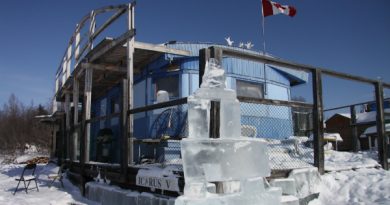The Arctic Council ministerial
Last week, I asked if Arctic policy was in a funk. I got my answer with the very encouraging Nuuk Declaration from the Arctic Council ministerial on Thursday – not only is Arctic policy not in a funk, it is alive, well, and progressing.
Ministers from the eight Arctic states, as well as the representatives of the indigenous Permanent Participants, met in Greenland for the biennial Arctic Council Ministerial, which is hosted on a rotational basis. (After Sweden’s chairmanship, which it adopts this week, the rotation will begin anew with Canada.) The meeting’s major deliverable was the signing of a legally binding agreement on Search and Rescue (SAR). That this would happen was well known in advance and has taken years of work; in itself the agreement is not particularly groundbreaking or consequential in terms of how search and rescue will actually occur. But from an Arctic policy perspective, it is massively significant because it the first legally binding instrument negotiated by the Arctic Council in its 15 year existence. As such it 1) marks a transition of the Arctic Council from a soft law to a hard law body; 2) indicates a deepening, rather than stagnation, of the circumpolar regionalization process; and 3) makes the Arctic Council seem relevant again. In that sense, while the SAR agreement is no panacea for the many ills of the region – not even the SAR ones – it is a critically important first step towards more effective regional governance.
By all indications, it seems as though this is the first step of many. Among the other achievements of the Ministerial is the establishment of a task force to develop an international instrument on Arctic marine oil pollution preparedness and response, which follows the same process as the SAR agreement and would likely be ready as the major deliverable of the 2013 Ministerial meeting. There is also the creation of an expert working group on Arctic ecosystem-based management. To conjecture wildly, the latter may indicate the establishment of a task force in 2013 on Arctic marine ecosystem-based management for signing of some kind of agreement in 2015 as Canada’s major deliverable. In this, I may be projecting my own hopes; but on the other hand, a line item like this does not happen by random, and almost certainly represents months of negotiations and a big ticket plan on someone’s behalf. It would also confirm the modus operandi for Arctic Council as: expert group → task force → legal instrument.
The final item of significance is the establishment of a Permanent Secretariat. This has been the favoured policy recommendation of the chattering class for years. Norway attempted to establish one during its chairmanship in 2006-09, but had to settle for the sly semi-permanent secretariat it established in Tromso, with the support of its successor chairs, Denmark and Sweden. The new Permanent Secretariat will probably function in exactly the same way and in exactly the same place as it has for the past five years. But it is notable because it demonstrates a comfort and willingness among the Arctic states of having a more formalized, and thus demanding, forum.
To whom do I credit these achievements?
I am loathe to acknowledge the Americans. Historically, the U.S. State Department has played spoiler to multilateral initiatives in the Arctic, and the political leadership in Washington has, for the most part, been uninterested and uninvolved. (By contrast, Alaskans – community members, indigenous leaders and politicians alike – and the American scientific community have been fully engaged and made invaluable contributions to the business of the Council). It seems strange, then, to thank them for not being obtrusive. But credit where credit is due. Hillary Clinton has stepped it up a notch. As the first U.S. Secretary of State to attend an Arctic Council ministerial, she has sent a message that the Americans want to have a larger role in the Council and are accepting of its central position in circumpolar relations.
The Russians, similarly, seem less intent this time around on castrating the Arctic Council. With their new mantra of cooperation in the Arctic, and real dollars – 10 million Euros – for supporting Arctic Council projects on pollution prevention in the region, the Russians have expressed their commitment to the work and importance of the Arctic Council.
The Norwegians have been so persistent, and after years the agenda they championed during their chairmanship has finally started to bear fruit. The Norwegian government has made the Arctic, or High North as they call it, a real priority, and the fingerprints of their leadership – especially the capable Foreign Minister Jonas Gahr Store – are all over the Nuuk Declaration.
While obsessed with domestic Arctic security issues, the Harper government has provided little substantive political leadership in circumpolar affairs; the one big initiative, the A5 meeting in Chelsea last March, was disastrous. But behind the scenes, Canadian bureaucrats and diplomats have been busy as beavers, making real contributions on SAR, shipping, sustainable development and more. The Ministers swoop in every two years for the photo ops, but the real work has to get done by somebody, and that somebody is often a Canadian.
Finally, the Danes, as Chair (along with Greenland) for the past two years, must deserve some of the credit. Although I have heard rumours that their chairmanship has been disorganized, the proof is in the pudding, and this Ministerial was a success.
There was, however, one significant miss – the failure to resolve the longstanding issue of China, South Korea, Japan, Italy and the European Union’s applications as observers to the Arctic Council (a category that already includes the UK, Germany, Netherlands and a handful of other states). Rather than give a straight answer, the decision has been delayed, and the process buried in the annex of the Senior Arctic Official (SAO’s) report. Basically the new guidelines on accepting observers give the Arctic Council any number of subjective reasons to endlessly delay the approval of applicants they do not like or trust (in this case, the EU is the former and China is the latter). Better to have the snowballs to give a definitive answer one way or the other.
The question of observers aside, for the first time in a long time, I feel optimistic about the prospects for Arctic governance. I felt this way when the UN Security Council approved the resolution to intervene in Libya – surprised, but encouraged, that states with conflicting agendas, interests and values can sometimes manage to solve the puzzle of international collaboration. The circumpolar region is among the most stable, wealthy and democratic in the world – in many ways a ‘most likely’ case for achieving cooperation and effective regional governance. It was concerning when they could (or would) not; it is a relief that they now are.


